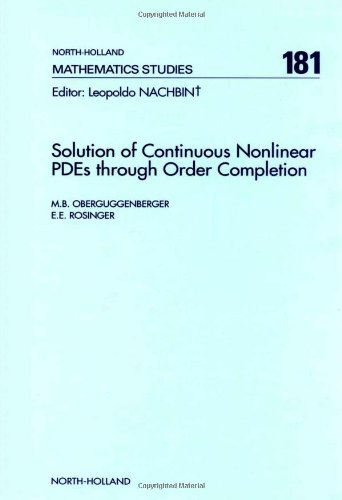North-Holland Mathematics Studies
3 total works
Vol 181
Solution of Continuous Nonlinear Pdes through Order Completion
by M.B. Oberguggenberger and E.E. Rosinger
Published 1 January 1994
This work examines a solution method for arbitrary continuous nonlinear PDEs. The solution method is based on Dedekind order completion of usual spaces of smooth functions defined on domains in Euclidean spaces.
Non-Linear Partial Differential Equations
by Elemer E Rosinger and E.E. Rosinger
Published 1 January 1990
A massive transition of interest from solving linear partial differential equations to solving nonlinear ones has taken place during the last two or three decades. The availability of better computers has often made numerical experimentations progress faster than the theoretical understanding of nonlinear partial differential equations. The three most important nonlinear phenomena observed so far both experimentally and numerically, and studied theoretically in connection with such equations have been the solitons, shock waves and turbulence or chaotical processes. In many ways, these phenomena have presented increasing difficulties in the mentioned order. In particular, the latter two phenomena necessarily lead to nonclassical or generalized solutions for nonlinear partial differential equations.
Generalized Solutions of Nonlinear Partial Differential Equations
by Elemer E Rosinger and E.E. Rosinger
Published 1 January 1987
During the last few years, several fairly systematic nonlinear theories of generalized solutions of rather arbitrary nonlinear partial differential equations have emerged. The aim of this volume is to offer the reader a sufficiently detailed introduction to two of these recent nonlinear theories which have so far contributed most to the study of generalized solutions of nonlinear partial differential equations, bringing the reader to the level of ongoing research. The essence of the two nonlinear theories presented in this volume is the observation that much of the mathematics concerning existence, uniqueness regularity, etc., of generalized solutions for nonlinear partial differential equations can be reduced to elementary calculus in Euclidean spaces, combined with elementary algebra in quotient rings of families of smooth functions on Euclidean spaces, all of that joined by certain asymptotic interpretations. In this way, one avoids the complexities and difficulties of the customary functional analytic methods which would involve sophisticated topologies on various function spaces.

